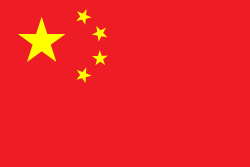| China at the Asian Games | |
|---|---|
 | |
| IOC code | CHN |
| NOC | Chinese Olympic Committee |
| Medals Ranked 1st |
|
| Summer appearances | |
| Winter appearances | |
People's Republic of China first competed at the Asian Games in 1974. [1] China has also participated at the Asian Winter Games since the first games held in 1986 in Sapporo. [2] China also hosted the three Summer Games in 1990, 2010, and 2022 and the three Winter Games in 1996, 2007, and 2025.
Contents
- Asian Games
- Medals by Games
- Medals by sport
- Medals by individual
- Asian Winter Games
- Medals by Games 2
- Asian Para Games
- Medals by Games 3
- Asian Beach Games
- Medals by Games 4
- Asian Indoor and Martial Arts Games
- Medals by Games 5
- Asian Youth Games
- Medals by Games 6
- Asian Youth Para Games
- Medals by Games 7
- East Asian Games
- Medals by Games 8
- Doping
- Medals by Asian Games in 1980 to 2000
- Disqualified Medalists
- See also
- References
During the 1974 Asian Games, China became the second nation in the history of Asian Games after Japan in 1958 to cross the 100 medal-mark in one edition. [3]
China has led the gold medal count in each Asian Games since 1982.
In 1986, China, together with Japan and South Korea became the first three countries in the history of Asian Games to cross the total 200 medal-mark in one edition, having become the only three countries with three-digit medal tally as well in that year. [4] China has been the only team to win more than 200 total medals at each Asian Games since 1986. [5]
In 1990, China achieved a significant milestone by being the first nation to surpass the threshold of 100 gold medals and 300 total medals in a single edition. [6] China also stands out among all Asian teams, being the only one to win more than 100 gold medals at each Asian Games since 1990. [6]
In 2010, China became the first nation in the history of Asian Games to cross the 400 medal-mark in one edition. [7]
At the 2022 Asian Games, China became the first nation to reach 200 gold medals in one edition. [8]
As of 2025, China finished at the top of the medal table 4 times out of 10 editions of the Asian Winter Games.